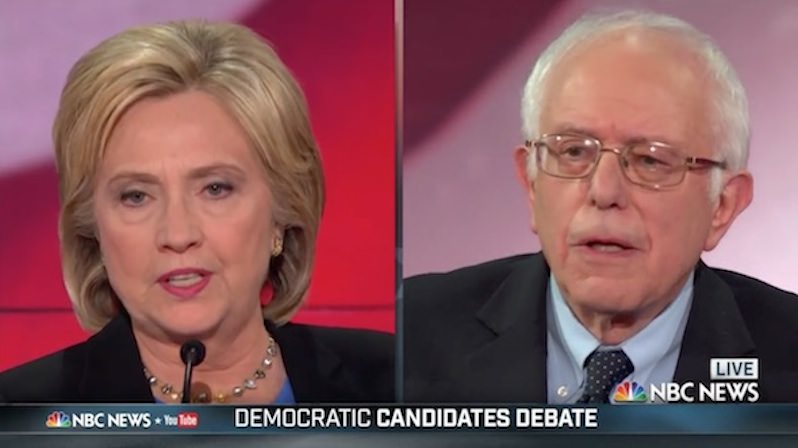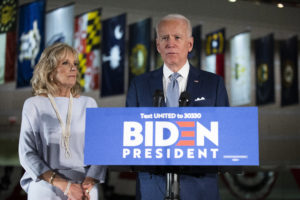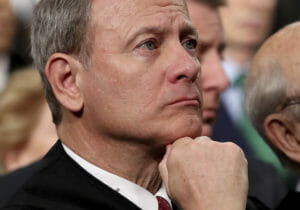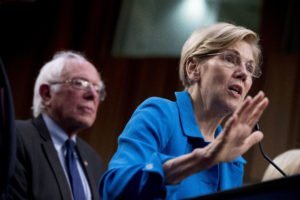The Choice for Democrats: Hillary Clinton’s Evolution or Bernie Sanders’ Revolution
On issue after issue, Clinton proposes incremental solutions that take into account our political system as it is. Sanders proposes dramatic solutions that will only be possible when power is wrested from "big money" interests. NBC News
NBC News
Hillary Clinton wrapped herself so tightly in President Obama’s mantle at Sunday night’s debate that it was a wonder she could walk off the stage.
She lauded the Affordable Care Act to the heavens, rejecting the notion that it left too many Americans still without health insurance. She defended Obama’s initiatives to rein in Wall Street, dismissing contentions that they did not go far enough. She highlighted his success in seizing Syria’s chemical weapons. She praised the way he “led us out of the Great Recession.”
And she attacked her chief rival for the Democratic nomination, independent Sen. Bernie Sanders of Vermont, for allegedly being insufficiently loyal to the president. “Senator Sanders called him weak, disappointing,” she said. “He even, in 2011, publicly sought someone to run in a primary against President Obama.”
READ: The Fourth Democratic Debate: In Which the Candidates Fact-Check Each Other
There was considerable irony in all of this. Eight years ago, the primary fight here between Clinton and Obama was bitter and tinged with racial overtones. This year, with the possibility that Sanders could win both Iowa and New Hampshire, Clinton is counting on South Carolina’s large African-American population to serve as a firewall. If there is anything not to like about the Obama legacy, apparently she hasn’t heard of it.
Sanders made the case that he has been, and remains, a supporter of the president. And he turned the tables, putting Clinton very much on the defensive when the subject turned to Wall Street excesses.
“I don’t mean to just point the finger at you,” he said, pointing his finger at Clinton, “you’ve received over $600,000 in speaking fees from Goldman Sachs in one year.”
Clinton’s response — that “hedge-fund billionaires” are running ads against her and that “I’m the one they don’t want to be up against” — probably failed to convince many listeners that she is more antagonistic toward Wall Street than Sanders, who frequently rails about all the executives who need to be sent to prison.
Former Maryland Gov. Martin O’Malley, the third candidate on the Gaillard Center stage, delivered a performance that was smooth, knowledgeable and, as things now stand, irrelevant. Focus was on the contest between the two leaders in the polls, Clinton and Sanders, who offer Democrats a clear choice: evolution or revolution.
The difference is evident in the two candidates’ positions on health care. Clinton proposes building on the foundation of Obamacare, the Children’s Health Insurance Program, Medicaid and Medicare to further expand coverage. Sanders advocates a new single-payer system, akin to those in other major industrialized countries, that would be truly universal and provide health care as a right.
Clinton recalled that in the fight over passage of the Obamacare legislation, efforts to include even one “public option” — government-run plan — had to be abandoned. To “start over again, pushing our country back into that kind of a contentious debate, I think is the wrong direction,” she said.
In other words, let’s have evolutionary change.
Sanders noted that there are still 29 million Americans without health insurance. He argued that a single-payer system, which he describes as “Medicare for all,” would not only provide coverage for everyone but also dramatically reduce medical costs. He said the issue is “whether we have the guts to stand up to the private insurance companies and all of their money, and the pharmaceutical industry. That’s what this debate should be about.”
Translation: We need a political revolution.
On issue after issue, Clinton proposes incremental solutions that take into account our political system as it is: sharply divided along ideological lines and warped by gerrymandering and virtually unfettered campaign contributions. Sanders proposes dramatic solutions that will only be possible when power is wrested from “big money” interests that refuse to do “what the American people want them to.”
In that sense, Democrats are being asked to make a classic heads-vs.-hearts decision. With Republicans controlling both houses of Congress, Clinton would ordinarily have a huge advantage. Given what’s happening in the GOP campaign, however, this doesn’t much look like an ordinary election cycle.
Sanders got a couple of the biggest cheers Sunday night, but for most of the evening the crowd seemed to be on Clinton’s side. In interviews afterward, several South Carolina political veterans predicted that Clinton would win the primary here, perhaps comfortably.
But the loyal Democrats I spoke with also wished there was more passion in Clinton’s appeal to go along with the pragmatism. To convince people to eat their vegetables this year, you might have to add a little hot sauce.
Eugene Robinson’s email address is [email protected].
© 2016, Washington Post Writers Group
Your support matters…Independent journalism is under threat and overshadowed by heavily funded mainstream media.
You can help level the playing field. Become a member.
Your tax-deductible contribution keeps us digging beneath the headlines to give you thought-provoking, investigative reporting and analysis that unearths what's really happening- without compromise.
Give today to support our courageous, independent journalists.






You need to be a supporter to comment.
There are currently no responses to this article.
Be the first to respond.